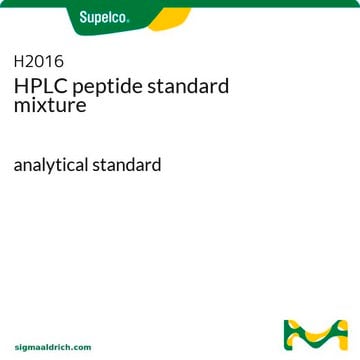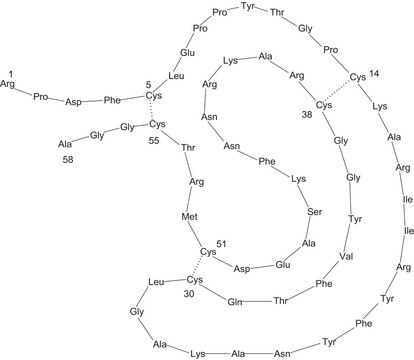I1633
Insulin chain A oxidized ammonium salt from bovine pancreas
≥80% (HPLC), powder
About This Item
Recommended Products
sterility
non-sterile
Quality Level
Assay
≥80% (HPLC)
form
powder
UniProt accession no.
shipped in
ambient
storage temp.
−20°C
SMILES string
[S](=O)(=O)(O)C[C@H](NC(=O)[C@@H](NC(=O)[C@@H](NC(=O)[C@@H](NC(=O)[C@@H](NC(=O)[C@@H](NC(=O)CN)[C@H](CC)C)C(C)C)CCC(=O)O)CCC(=O)N)C[S](=O)(=O)O)C(=O)N[C@@H](C)C(=O)N[C@@H](CO)C(=O)N[C@@H](C(C)C)C(=O)N[C@@H](C[S](=O)(=O)O)C(=O)N[C@@H](CO)C(=O)N[C@@H](CC(C)
InChI
1S/C97H151N25O46S4/c1-12-46(10)77(120-72(131)35-98)96(154)122-76(45(8)9)94(152)107-55(24-28-74(134)135)79(137)104-53(22-26-69(100)128)82(140)116-66(40-171(163,164)165)93(151)118-64(38-169(157,158)159)90(148)103-47(11)78(136)114-63(37-124)89(147)121-75(44(6)7)95(153)119-67(41-172(166,167)168)92(150)115-62(36-123)88(146)109-57(30-43(4)5)84(142)110-58(31-48-13-17-50(125)18-14-48)85(143)105-52(21-25-68(99)127)80(138)108-56(29-42(2)3)83(141)106-54(23-27-73(132)133)81(139)112-60(33-70(101)129)87(145)111-59(32-49-15-19-51(126)20-16-49)86(144)117-65(39-170(160,161)162)91(149)113-61(97(155)156)34-71(102)130/h13-20,42-47,52-67,75-77,123-126H,12,21-41,98H2,1-11H3,(H2,99,127)(H2,100,128)(H2,101,129)(H2,102,130)(H,103,148)(H,104,137)(H,105,143)(H,106,141)(H,107,152)(H,108,138)(H,109,146)(H,110,142)(H,111,145)(H,112,139)(H,113,149)(H,114,136)(H,115,150)(H,116,140)(H,117,144)(H,118,151)(H,119,153)(H,120,131)(H,121,147)(H,122,154)(H,132,133)(H,134,135)(H,155,156)(H,157,158,159)(H,160,161,162)(H,163,164,165)(H,166,167,168)/t46-,47-,52-,53-,54-,55-,56-,57-,58-,59-,60-,61-,62-,63-,64-,65-,66-,67-,75-,76-,77-/m0/s1
InChI key
WYHLQQAVJPCFKN-DQLAGKHYSA-N
Gene Information
cow ... INS(280829)
Looking for similar products? Visit Product Comparison Guide
Amino Acid Sequence
Biochem/physiol Actions
Preparation Note
Storage Class Code
11 - Combustible Solids
WGK
WGK 3
Flash Point(F)
Not applicable
Flash Point(C)
Not applicable
Personal Protective Equipment
Choose from one of the most recent versions:
Already Own This Product?
Find documentation for the products that you have recently purchased in the Document Library.
Customers Also Viewed
Our team of scientists has experience in all areas of research including Life Science, Material Science, Chemical Synthesis, Chromatography, Analytical and many others.
Contact Technical Service

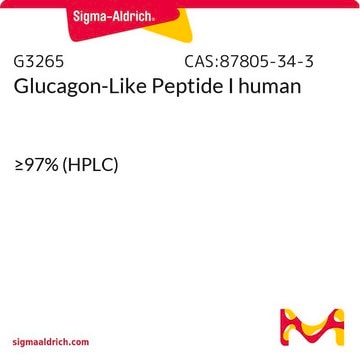

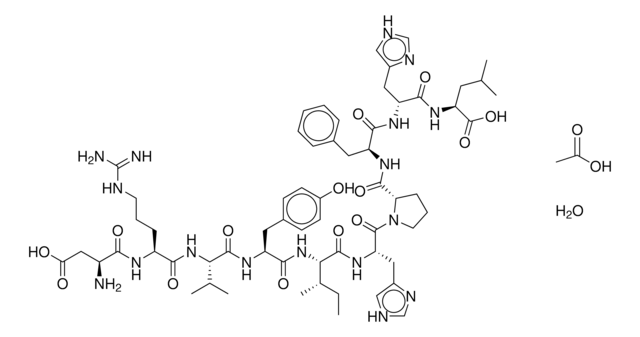

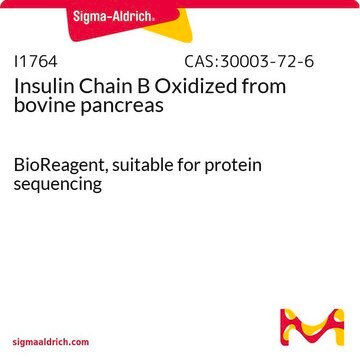



![[Glu1]-Fibrinopeptide B human ≥90% (HPLC)](/deepweb/assets/sigmaaldrich/product/structures/122/537/7ead5c32-cb67-4325-9ce7-66c8dec24bdd/640/7ead5c32-cb67-4325-9ce7-66c8dec24bdd.png)
